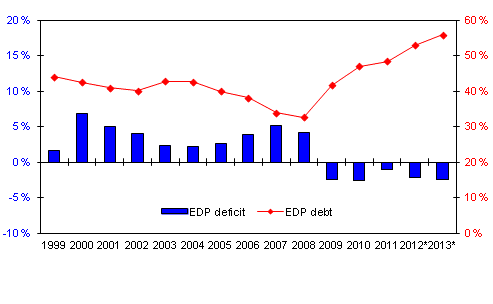Published: 30 September 2014
Revised general government deficit and debt figures for 2013 released
According to Statistics Finland's revised preliminary data, at the end of 2013, Finland's general government consolidated gross debt stood at EUR 112.7 billion and was 56.0 per cent relative to GDP. The financial position of general government showed a deficit of EUR 4.9 billion in 2013. This is 2.4 per cent relative to GDP. The general government deficit and debt figures are now published according to the new System of Accounts (ESA 2010), for which reason the figures have changed more than usual from the previous publication of the statistics.
Finland's general government deficit (-) and debt, ratio to GDP

General government gross debt grew by EUR seven billion in 2013. Of this, central government accounted for EUR five billion and local government for EUR two billion. Internal general government debt decreased by EUR 0.1 billion. The EDP debt describes general government’s debt to the other sectors of the economy and to the rest of the world, and its development is influenced by changes in both the unconsolidated gross debt and the internal general government debt.
The financial position of general government weakened from the year before by around EUR 700 million. Central and local government deficits diminished, but the surplus of social security funds contracted by EUR 1.4 billion and pushed the development of the whole general government into the negative. The data concerning 2010 and 2013 were now revised somewhat compared with the data published in July under national accounts. The financial position of general government in 2010 deteriorated by EUR 147 million, and in 2013 it weakened by EUR 144 million compared to the figures released in July.
Of the changes introduced by the new ESA 2010 System of Accounts, the updated definition of sectors and the change in the EDP deficit concept had most effect on general government deficit and debt. General government now includes such as the state-owned enterprise Senate Properties and such enterprises owned by municipalities that produce services primarily for their owners. The EDP deficit does no longer include interest flows relating to swap and forward rate agreements, whereby the EDP deficit now corresponds with the net lending of the general government sector account in national accounts.
In general government accounts, the European Financial Stability Facility EFSF is, based on Eurostat's decision, handled so that the EFSF's borrowing is recorded as part of the gross government debt of the countries that have provided guarantees. The loan received by the beneficiary country from the EFSF is recorded as if it had been received from the countries in the euro area that have provided guarantees and these countries in turn owe the corresponding amount to the EFSF. As a result, the EDP gross debt of the countries that provided guarantees grows but the net debt remains unchanged because the countries have a similar receivable from the beneficiary country. The gross government debt to be recorded for each country on the loans granted by the EFSF is calculated by dividing the loan granted to the beneficiary country by the contribution key (based on the share in the ECB's capital of each country participating in the support operations).
For 2013, EUR 3,426 million has been recorded as debt granted by the EFSF to beneficiary countries in Finland's general government debt, while the amount at the end of 2012 was EUR 2,702 million. No corresponding handling is made in the case of the European Stability Mechanism (ESM).
The EDP debt of general government differs conceptionally to some extent, for example, in the case of central government, from the central government debt published by the State Treasury. Central government's EDP debt includes loans granted to the beneficiary counties by the European Financial Stability Facility EFSF (as explained above), received cash collaterals related to derivative contracts, the capital of the Nuclear Waste Management Fund, debts generated from investments in central government's PPP (public-private partnership) projects, and coins that are in circulation. In national accounts, central government is also a broader concept than the budget and financial economy, in addition to which it includes, for example, universities, Solidium, the Finnish Broadcasting Company and Senate Properties. When these differences are taken into consideration, we reach the central government non-consolidated gross debt in accordance with the EDP concept (Appendix table 3), i.e. in 2013, the State Treasury's central government debt EUR 89.7 billion + conceptual differences of the debt EUR 9.1 billion + differences caused by the sector delimitation EUR 3.1 billion = central government non-consolidated gross debt EUR 101.9 billion. The valuation principle for both debt concepts is the nominal value, where the effect of currency swaps is taken into account.
Eurostat will verify the deficit and debt figures reported by the Member States over the following weeks. In this process, changes may be made to the figures reported by Statistics Finland. In that case, the updated figures will be released on the pages of these statistics on 21 October, on the same day that Eurostat will publish the data.
Source: General government deficit and debt. Statistics Finland
Inquiries: Niina Suutarinen 029 551 2307, Jukka Hytönen 029 551 3484, financial.accounts@stat.fi
Director in charge: Leena Storgårds
Publication in pdf-format (251.5 kB)
- Tables
-
Tables in databases
Pick the data you need into tables, view the data as graphs, or download the data for your use.
Appendix tables
- Appendix table 1. General government EDP deficit 1998-2013 (30.9.2014)
- Appendix table 2. General government EDP debt 1998-2013 (30.9.2014)
- Appendix table 3. General government non-consolidated gross debt and EDP debt 2000-2013, billion EUR (30.9.2014)
- EDP reporting tables, October 2014 notification (updated 30.9.2014) (Excel) (30.9.2014)
Updated 30.9.2014
Official Statistics of Finland (OSF):
General government deficit and debt [e-publication].
ISSN=1799-5914. 2013. Helsinki: Statistics Finland [referred: 19.2.2026].
Access method: http://stat.fi/til/jali/2013/jali_2013_2014-09-30_tie_001_en.html

